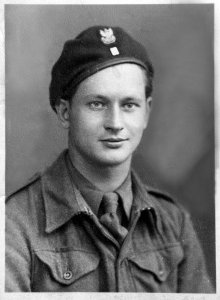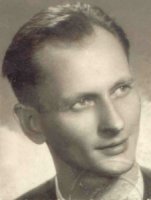
Aleksander Kowalewski,
son of Paweł and Agata; born on August 17 1920 in Vilnius; died on May 20 1997 in Warsaw
ps. "Longinus", the "Baszta" regiment of the liaison company K4
The Witnesses' Uprising Reports
THE GERMAN DIVERSIONARY ACTIONS DURING THE WARSAW UPRISING

Aleksander Kowalewski,
son of Paweł and Agata; born on August 17 1920 in Vilnius; died on May 20 1997 in Warsaw
ps. "Longinus", the "Baszta" regiment of the liaison company K4
In a book by Kazimierz Malinowski entitled "Żołnierze łączności w walczącej Warszawie" ("The liaison soldiers in the fighting Warsaw"), the author quoted the statement of General von dem Bach who, talking with Colonel Heller (Kazimierz Iranek Osmecki) during the capitulation negotiations in Ożarów, stated that the Germans would redeploy informers to the city by means of the ditches, mainly Volksdeutschs (citizens of German descent) or the Ukrainians who, having gained the needed information, would come back together with the civilians escaping from the besieged city. In order to confirm the German diversionary actions on the areas occupied by the insurgent troops, I will describe the following fact.
From September 1 1944 onwards, the fights in the areas of Czerniakowska and Chocimska streets escalated. Having occupied the Sadyba district, the Germans started to attack us from two sides, i.e. Czerniaków and Podchorążych street, trying to drive us back in the direction of Belwederska street in order to capture the Dolny Mokotów district. Our telephone line went from the headquarters - the fragment situated in Stępińska 4 street, went further along the Chełmska street and, crossing the Belwederska street, joined them with 10-number-switchboard in the Piaseczyńska street. Most damages were made in the Belwederska street where a cable went along a low barricade that covered the pedestrians who crossed the Belwederska street in a not very careful way. The Germans would shoot there much from their positions in the Willowa and Słoneczna streets. Even not seeing any preventive movements they would fire at this barricade. Bullet ricochets or flagstones' silvers lying at the top of the barricade would cut a line cable from time to time. We decided to remedy that and increase the line reliability. What had to be done was to double or even triple the number of veinlets on that fragment in order to have the communication maintained at the case of cutting one or two veinlets. Nevertheless, for these aims to be achieved, we needed an additional cable. The one used until then was cut in many places; in addition joints that were made in such conditions, with lack of appropriate insulation, were imperfect. Within evening hours and increased air humidity line earths occurred, which would worsen audibility or would even interrupt the communication. I did inform the platoon commander, Lieutenant "Kępa", of that situation, asking for a cable. He made me realize that we had been run out of all the provisions. He could only give me a part of a cable used for the light installation. He also made a point that we ourselves should look for this type of cable in our area.
While going to the headquarters by the Dolna street, I was jealously observing a line joining a telephone exchange in the Piaseczyńska street with the switchboard in the Malczewskiego street that was built by means of an acquired German cable in beautiful blue insulation. Each piece of wire or cable I noticed did arouse my interest.
When I was about to reach the Puławska street suddenly I noticed a not insulated telephone wire that was hanging down an acacia branch that was situated on a slope in the Dolna street. Unfortunately, this wire would not be useful for our aims. I was to go further but I noticed that its second end reached a veranda roof of the Hygienic building standing over a pit in the Dolna street and disappeared under a cover of the veranda roof. This made me feel uneasy. Maybe this is a master of bugging? The wire arrangement (the wire could have been treated as a broken telephone network that was a common thing in those times so it would not arouse any special interest), the fact that it was partly hidden in leaves of a tree top and, at last, the existence of the second end of the wire under the roof cover, which could be seen only from some positions - all these made me think it was an unclear matter.
Excited, I went upstairs, to go into the Hygienic building from the side of the Puławska street. It was a two- or three-storied house (I don't remember that exactly). On entering the house, I went on the first floor, along the corridor to reach the southern wall on the side of the Dolna street. Looking out of the window, I saw the veranda roof. It was made of sheet metal. On the southern side there was a cover under which the second end of the wire disappeared. I was thinking what to do next. Shall I open the window and look into a manhole? Or would it better to organize a raid directed by specialists in this area? By acting rashly I could only frighten people away, not finding a delinquent. I left the building unnoticed, ran to the seat of the Second Squad and reported. The patrol was organized immediately. I went with them to the Hygienic building. We surrounded it. With three patrol soldiers, I went inside. We found a caretaker and together with him we went to the window from which one could go on the veranda roof. Above the others, we had to see whether or not somebody hidden was inside. I went on the roof and raised the cover, trying to look inside. In the lit part I noticed hay lying there. This meant that somebody made a comfortable bed there. As I didn't hear any sounds in the attic, I decided to go inside. I crawled slowly into a gap, holding its corners. Not seeing the interior, I tried to examine by legs if I am to meet some obstructions. Nothing like that happened. Being inside, I could observe the attic interior only in a lying position. Unfortunately, I found nothing but hay and the wire end. The attic was empty at the time. A person who made a bed and bugging there was somewhere else. Who else was initiated in the matter - was to be explained. This was a job for the officials of the Second Squad. They were given the case in order to explain it thoroughly. I had to come back to my duties.
After three or four days I received a paper in the headquarters in which the Command-in-chief of the Second Squad thanked me for shown vigilance and help in the suppression of the diversionary acts; unfortunately a document confirming that was taken away from me during the personal search after leaving the ditches in the Dworkowa street.
Aleksander Jacek Kowalewski
Translated by Monika Ałasa

|
Aleksander Jacek Kowalewski ps. "Longinus" 'Baszta' regiment, K4 communication company (born: Wilno 1920 - died: Warszawa 1997) |
Copyright © 2005 SPPW1944. Wszelkie prawa zastrzeżone.